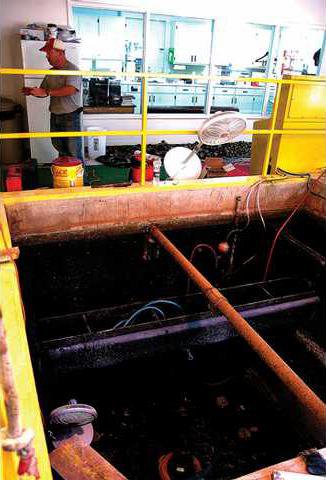DAHLONEGA — It’s been a long week for the six employees of Dahlonega’s city water works after an aging filter collapsed without warning and cut the plant’s capacity of 1.5 million gallons per day in half, putting the city’s clean water supply in perilous straits.
"It’s just been all-out bucket brigades," Dahlonega Water Superintendent John Jarrard said of the hours spent cleaning out layer upon layer of filtration sand, gravel and coal from a 180-square-foot area that filters 7,000 gallons of water at a time.
By Thursday, the hand-digging grunt work was complete, and with the help of Conyers-based Rehab Construction, preparations were in place to install a replacement filter system. After earlier projections put the repairs as long as a month away, Dahlonega City Manager Bill Lewis said on Thursday that he hopes the replacement system, with parts coming from out of state, can be in place by Tuesday or Wednesday.
Officials likely are to breathe a sigh of relief if and when that happens. For now, a major water main break, a large fire or the failure of the second filter could mean big trouble.
"What people need to know is there is a potential for problems," said Lewis, who called the anticipated mid-week fix "an optimistic target date."
"Our concern is for fire protection and water for basic human needs," he said.
The city has imposed a total outdoor watering ban and has sought the state Environmental Protection Division’s permission to make that ban all-encompassing and possibly longer than the allowed seven-day period. Area industries and the city’s biggest water consumer, North Georgia College & State University, also are doing their part.
There’s about two days’ worth of potable water stored in the city’s tanks should the second filter fail between now and next week, though a crucial test of the filter Thursday morning had water officials confident it would hold up at least another 80 hours, Jarrard said.
"That was the scary part," Jarrard said. "We have grave concerns that the other filter is the same way."
The water plant’s two main filters were built in 1975 with construction methods that wouldn’t pass muster today, Jarrard said. A system of concrete platforms that hold filtration materials such as sand and gravel are supported by cylindrical concrete piers. The metal rods inside the piers apparently rusted and failed, causing a collapse of the platforms Friday and leaving what looked like a large funnel in their place.
"There were no warning signs and no way to inspect for it," Jarrard said, adding that such a failure "is very rare" in the water works business.
The city will move into a new, 4 million-gallon-per-day capacity water plant in January 2010.
"We’re only a year and a half from our new plant, but it didn’t wait that long," Jarrard said.
The county’s 2,700-plus water customers have seen no change in water quality or pressure, and are unlikely to if the system holds out until the new filter is installed, officials said.
Lewis said local bearing plant Timpken has agreed to water conservation efforts and is "on stand-by" should more be needed.
North Georgia College & State University, which typically uses between 120,000 and 135,000 gallons of water per day, has taken conservation steps of its own, said Director of University Relations Kate Maine.
"We have eliminated all outdoor watering and converted dining facilities to paper plates for the time being so we don’t incur additional water use through washing dishes," Maine said. The university’s 5,500 students have also been asked to conserve, including, for those who live on campus, taking shorter showers, Maine said.
On Thursday, several residents remained blissfully unaware of the city water crunch.
"I’ve got a well I can hook into if I need to," said Johnny Burt, who waters most of the plants in the garden in front of his home on Ga. 60 with spring water and has only been hooked onto the city’s water system for five years.
The recent deluge of rain should make the watering ban easier for folks to swallow, too, he said.
"We got a heckuva lot of rain here," he said.

